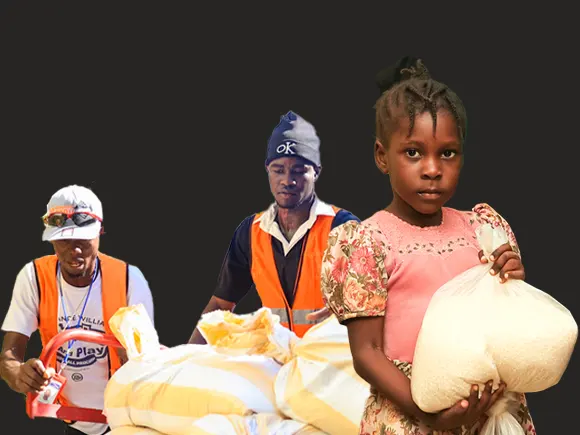FFP Continues to Send Aid to Hurricane-Ravaged Dominica
COCONUT CREEK, Fla. (Dec. 12, 2017) The 2017 hurricane season ended Nov. 30. But many people in the Caribbean still are struggling to recover from the devastating blows of back-to-back Hurricanes Irma and Maria in September.
Food For The Poor continues to send lifesaving aid to Dominica, St. Lucia, St. Thomas and Puerto Rico.
Thanks to our generous donors and partners, the charity has shipped 68 containers to Dominica, 55 to Puerto Rico, 35 to St. Lucia and two to St. Thomas.
Items include commercial-grade and standby generators, tarps, flashlights, batteries, canned goods, water, diapers, hygiene kits, zinc sheets and nails, roof straps, ridge caps, lumber, plywood, folding beds and mattresses, student desks and chairs, desks for teachers, canned food, MannaPack rice meals, evaporated milk and rice.
Underscoring the magnitude of this effort, the number of containers shipped to Dominica is more than twice what the charity typically sends to the island in an entire year. A team from Food For The Poor visited the island last week to assist longtime partner R.E.A.C.H (Reaching Elderly Abandoned Citizens Housebound) in the distribution of relief as crews work day and night to unload containers at Dominica’s overwhelmed port.
“Dominica was devastated. Two months down the road and it’s still very tough for everybody there,” said Javier Ramirez, Food For The Poor’s Gifts In Kind Director, who traveled to Dominica.
About 300 containers of aid are arriving each week compared to 120 that typically are unloaded at the port. Because of the volume of shipments, it takes 10 to 15 days to clear a single container compared to four to five days typically. Most aid is being distributed directly from the port with other goods transported to an old sugar mill that is serving as a temporary warehouse.
Food For The Poor is purchasing a heavy duty forklift capable of lifting entire empty containers to help reduce congestion at the port and unload aid faster. It will be shipped to Dominica within the next two weeks.
The supplies provided by Food For The Poor’s donors and partners are reaching 28 communities comprising about 15,000 people on the island. About 40 percent of Dominica’s 74,000 residents fled the island after the storm. Some faced the agonizing decision of separating their family, with some members staying behind to rebuild the country and the rest evacuating on boats with one-way tickets.
Hurricane Maria slammed into Dominica in the early morning hours of Sept. 18 with Category 5-strength winds of 160 mph, wiping out tourism and agriculture, two mainstays of the country’s economy. The forests that gave the “Nature Island” its nickname have been stripped away or flattened. To date, 31 are dead and 37 are reported missing, according to the government of Dominica.
About 45 schools have reopened, but 88 remain closed. Nearly 95 percent of the island still is without power. Officials say it may take years to restore electricity everywhere. A lack of clean water has left the island’s most vulnerable at risk of disease.
“The lives of tens of thousands of people have been turned upside down because there’s no light, no running water and countless homes have been destroyed,” said Food For The Poor President/CEO Robin Mahfood. “Families in Dominica, Puerto Rico and the other Caribbean islands devastated by these hurricanes need help now and they’re going to need it for a long time. We will do our very best to help as many as we can there, and in the countries where we serve to recover from these back-to-back disasters.”
While Food For The Poor’s mission primarily is to serve internationally, the charity has responded in the past to catastrophic disasters in the United States and now to the U.S. territory of Puerto Rico.
A team from Food For The Poor is in Puerto Rico this week to assist in San Juan to assure the distribution of relief items.
Food For The Poor, one of the largest international relief and development organizations in the nation, does much more than feed millions of the hungry poor primarily in 17 countries of the Caribbean and Latin America. This interdenominational Christian ministry provides emergency relief assistance, clean water, medicines, educational materials, homes, support for orphans and the aged, skills training and micro-enterprise development assistance, with more than 95 percent of all donations going directly to programs that help the poor. For more information, please visit www.FoodForThePoor.org.
Michael Turnbell
Public Relations
954-427-2222 x 6054
michaelt@foodforthepoor.com
